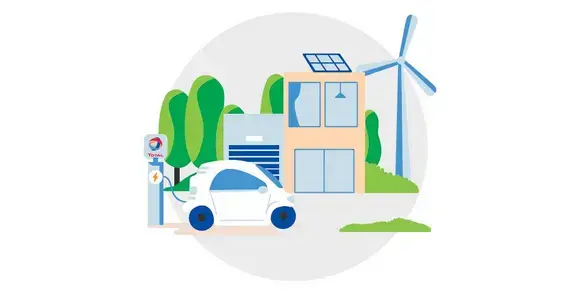
SUPERETHANOL E85 (E85) gasoline is a renewable fuel made mainly from the fermentation of plants and vegetables containing sucrose and/or starch, such as beet, corn, wheat, and others.
It is a mixture of 65 to 85% bioethanol (between 65% and 75% in winter, and between 75% and 85% in summer) and between 15 to 35% fossil fuel (SP95).
In France, the production of ethanol used in mobility is mainly national (83%), mainly from wheat (35%), corn (30%), and beet (23%)[1]. Its marketing supports French agriculture while covering less than 1% of the country's useful agricultural area. With 12 million hectoliters, France is the 1st European producer of bioethanol.
Due to its high ethanol content, E85 cannot be used directly in conventional petrol engines. Specific vehicles with "Flex Fuel" technology are compatible with this fuel. These can be fueled by all different gasoline ranges, containing 0 to 100% ethanol. However, it is possible to equip conventional gasoline vehicles with approved E85 boxes. To do this, you only have to buy the approved electronic box and have it installed by an approved garage (under certain conditions)
The Ecosolutions Advantage
E85 fuel is certified sustainable following the European Union's renewable energy directive
In addition to being very favorable in terms of reducing CO2 emissions, SUPERETHANOL E85 has no impact on human health. This has been demonstrated by examining the MSDS of the two products: SP95-E10 gasoline and SUPERETHANOL E85.
Moreover, unlike fossil fuels (produced from petroleum), biofuels are produced from bio-sourced raw materials (mainly plants) and are therefore renewable. E85 also contributes to the circular economy. Indeed, an amount of about 10% of beer and wine residues is used for the production of bioethanol.
Finally, although ethanol has a lower energy content than fossil gasoline, it benefits from an advantageous tax system, with a price about 46% cheaper than SP95-E10 gasoline (pump price between 0.60 €/L and 0.80 €/L). Despite the extra consumption, it remains financially interesting for the consumer.
The Environmental Performance
Compared to the most sold gasoline in France, the SP95-E10 (90% fossil, 10% ethanol) and for an equivalent service: "Traveling 100 km in a light vehicle with a gasoline engine", the E85 allows :
A 45% reduction in greenhouse gas emissions
These results are based on a Life Cycle Analysis of the "Well to Wheel" cycle, which takes into account emissions linked to the production of the fuel and its use. In this study, we do not deal with the emissions linked to the manufacturing of the vehicle, nor with the emissions linked to recycling. It is assumed that the type of vehicle used is the same for all fuels (fossil or renewable).
External External
Indepedendent auditor EY has verified that this product was labeled according to the method described in the TotalEnergies Ecosolutions Guidelines and that the guidelines comply with the principles set out in the ISO 14020 and 14021 standards which govern environmental claims and particularly their accuracy.
More information
-
Labeling date: March 2021
-
Label deadline: December 2025 - Standard v7
-
Geographic scope: France

Approach & label
Ecosolutions program by TotalEnergies enables our customers to consume less and better.

Our Ecosolutions in brief
Learn more about the emblematic ranges of the Ecosolutions label by TotalEnergies.

Beyond the label : our complementary approach "Eco-Impact"
The Eco-impact approach is a new complementary and experimental pilot program, launched with the support of external stakeholders.